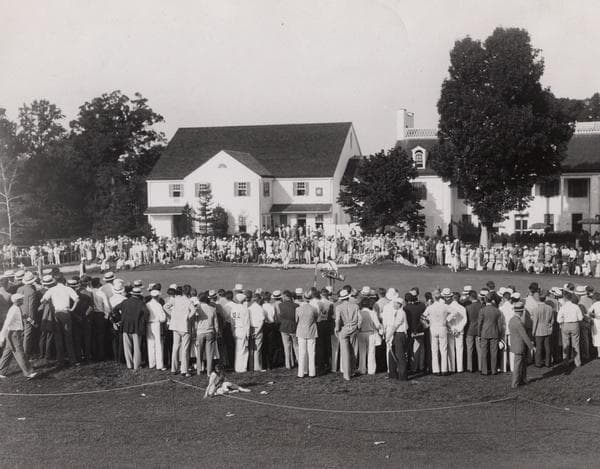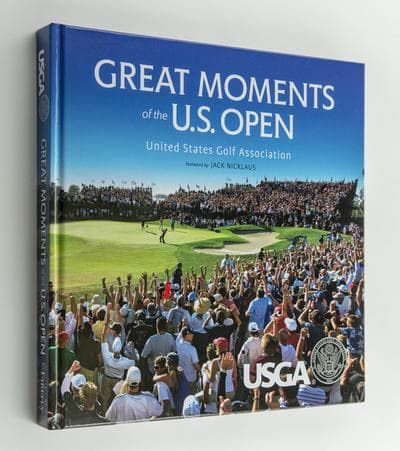Advertisement
Featured Book
'Great Moments of the U.S. Open': A Historical Overview Of A Golf Major

When a tournament has as much history as golf's U.S. Open there are bound to be many memorable moments.
Robert Williams and Michael Trostel have come up with a book, Great Moments of the U.S. Open, that documents some of the best. Trostel and Billy Casper, who won the event twice and is the subject of a chapter in the book, joined Bill Littlefield.
Highlights From Bill's Conversation with Billy Casper and Michael Trostel
BL: Mr. Casper, when you won the tournament in 1966, you faced one of the most popular golfers of all time, Arnold Palmer, in a playoff. The large group then called "Arnie's Army" would have had it otherwise. Did that complicate matters for you?
BC: Not at all, because the people in the U.S. are followers of underdogs, and obviously I was an underdog. And as I started catching up many of his army deserted the ranks and became Casper converts.
BL: That must’ve felt great.
BC: It was. It was really neat.
BL: Only a handful of players have won the U.S. Open more than once, and yet at the end of the chapter about the '66 tournament, you are referred to as "one of the most accomplished yet underappreciated golfers in history." Does that feel like a fair characterization?
BC: The Golf Channel did a survey a little over a year ago to rank the most underrated players, and I think I was number one. So that’s a verification.
Advertisement
BL: If you ask people today to name one great golfer, they're likely to say Tiger Woods. Maybe some of them would say Jack Nicklaus. But the chapter titled "America's First Golf Hero" gives us Francis Ouimet, who won the Open in 1913. Assess his importance to the tournament and to golf in the U.S.
MT: Well, the argument that we make in the book is that Ouimet’s win is really the most significant moment in American golf history. Probably one of the greatest upsets of all time, maybe in any sport. Beating Harry Vardon and Ted Ray, two of the most accomplished athletes in the game of golf at the time, coming over from Great Britain. Ouimet grew up across the street from the country club. He’s a 20-year-old amateur. He wasn’t the first American to win, but because he beat Vardon and Ray it was really the most significant win. And he did it with a 10-year-old caddy, this kid named Eddie Lowery who skipped school to come and caddy for Ouimet. It’s really the stuff made of movies, and that’s why there was a movie made of it. It put golf on the front pages of newspapers for the first time in America and inspired a new generation of players from Walter Hagen, Gene Sarazen, to Bob Jones who became the best golfers in the country and eventually the best golfers in the world. In the generation that followed Ouimet’s win more than two million golfers took up the game in America. It was certainly the jumping off point for golf in America.
BL: And Mr. Trostel, can you pick a favorite chapter in the book from which to draw a story that will prepare us especially well for the drama sure to transpire at this year's Open?
MT: I’d say one of my favorite chapters in the book is Ben Hogan’s win in 1950. What makes Hogan’s story so special is that he had a near-fatal car accident just 16 months before, in February 1949. It’s a situation where doctors told him he may not walk again, never mind play golf. It was really through sheer force of will that Hogan was able to overcome the odds and even play. There were 36 holes played on the final day. Hogan played wonderfully. Despite bogeys on 15 and 17, he was still tied for the lead coming to the 18th tee. He hit a beautiful drive and then hit that iconic one iron onto the green at the 18th hole, two putted for par to force a playoff the following day, which he won. The comeback is really one of the more inspiring in the history of sports. It really resonated with a group of individuals who were coming back from crippling injuries from World War II. I think that’s what makes it special. It’s not just a golf story. It inspired a movie. It’s a story that transcends not just golf, but all culture.
BC: My belief is the game of golf is far more than just the physical ability. There’s a mindset that you must use to be a good player and a heartset, and Hogan exercised both of those. And I think about Tiger Woods being told two weeks or several days before the Open Championship at Torrey Pines not to play -- that he needed to get his leg fixed -- and he said, “I’m gonna play, and I’m gonna win the Open.” So here it is again: the mindset and the heartset.
Bill's Thoughts on Great Moments of the U.S. Open
In the foreword to Great Moments of the U.S. Open, Jack Nicklaus writes, "I have always considered the U.S. Open the most important major championship." This suggests that the editors of the book found the right guy to compose the foreword, but a case can be made for Nicklaus's contention, and the book makes the case pretty well.
The stories of such relatively recent Open winners as Nicklaus himself and Arnold Palmer, not to mention Tiger Woods and Rory McIlroy, are well known, at least to fans of the game. But some of the more intriguing tales are set in the tournament's early days. In 1911, just 16 years after the first Open, a 19-year-old named Johnny McDermott won the tournament. He repeated that achievement in 1912. According to Grantland Rice, McDermott was "the greatest golfer America has ever produced, amateur or professional, when it came to a combination of nerve, coolness and all-around skill from the tee to the green." Even taking into consideration Mr. Rice's penchant for overstatement, that's heady stuff, but it could be argued in retrospect that Johnny McDermott used up his good luck early. Financial losses, an accident at sea, and various other disasters major and minor apparently unhinged him. After being diagnosed with chronic schizophrenia in 1916, McDermott was committed to a state hospital for the insane. He spent much of the next 55 years in mental institutions and rest homes and died a few days before he would have turned 80.
Few of the stories in Great Moments of the U.S. Open involve highs as high and lows as low as the tale of Johnny McDermott, but fans of golf and stories will relish the opportunity to become acquainted with the various facets of the tournament's history.
This segment aired on June 15, 2013.
